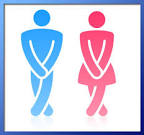
Incontinence affects 4.8 million Australian men and women of all ages as well as their families but it doesn’t have to be that way – that’s the bottom line!
In the lead-up to World Continence Week, 20-26 June, Dr Philip Hall at St Andrew’s War Memorial Hospital in Spring Hill said it wasn’t only the people with incontinence who were affected by the debilitating condition but also their families and friends.
“A lack of control over bladder and bowel movements has led to a stigma associated with the condition. In many cases patients are embarrassed discussing it even with their doctors,” said Dr Hall who will visit the Fraser Coast Seniors’ Expo on 5 August.
“Carers and relatives face difficulties in their lives having to hide the embarrassment of the incontinent person while also trying to persuade him or her to acknowledge and seek help.
“People with the condition may become socially isolated and the tasks carers have to do with hygiene and laundry can result in their tiredness, frustration and desperation.”
Dr Hall and colleagues at St Andrew’s War Memorial Hospital’s Pelvic Medicine Centre are trying to reduce the impact of this stigma and offer the community hope.
“Incontinence is not a part of normal aging and people should not suffer in silence. It is highly treatable,” Dr Hall said.
“The treatment of prolapse and urinary incontinence include Botox, sacral neuromodulation and other minimally invasive techniques, which can dramatically transform the lives of those affected.
“With sacral neuromodulation, a small device, similar to a pacemaker, is surgically implanted to send mild electrical pulses to the sacral nerves.
"Located near the tailbone, the sacral nerves control the bladder and the muscles related to urination. If the brain and sacral nerves don’t communicate correctly, the nerves can’t tell the bladder to function properly.
“Anyone experiencing involuntary bladder or bowel movements is encouraged to speak with their local General Practitioner about a referral to St Andrew’s War Memorial Hospital.”
Dr Hall is a gynaecologist at St Andrew’s. He has been involved in women’s health for 30 years and also treats men with urinary and faecal incontinence.
This year’s World Continence Week theme is Improve your bottom line, encouraging people to adopt healthy bladder and bowel habits to prevent and improve incontinence.
The week is an initiative of the International Continence Society and is coordinated in Australia by the Continence Foundation.
For more information on St Andrew’s Pelvic Medicine Centre visit
http://thepelvicmedicinecentre.com.au